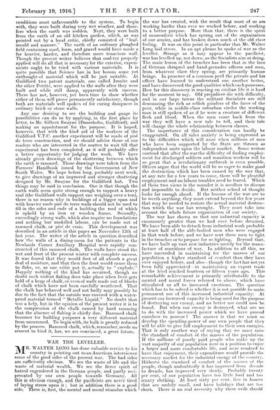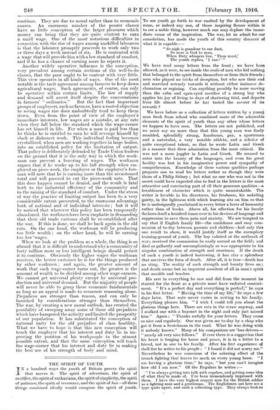WAR THE LEVELLER.
MR. WALTER LONG has done valuable service to his country in pointing out to an American interviewer some of the good sides of the present war. The bad sides are sufficiently obvious. We see the waste of life and the waste of material wealth. We see the fierce spirit of hatred engendered in the German people, and partly reci- procated by our own people towards Germany. All this is obvious enough, and the pacificists are never tired of laying stress upon it ; but in addition there is a good side. There is, first, the mental and moral stimulus which the war has created, with the result that most of us are working harder than ever we worked before, and working to a better purpose. More than that, there is the spirit of camaraderie which has sprung out of the organization of our armies, and has broken down much of the old class feeling. It was on this point in particular that Mr. Walter Long laid stress. In an apt phrase he spoke of war as the leveller. Strange as it may appear to the pacificist, war has levelled up, not down, as the Socialists aim at doing. The main lesson of the trenches has been that in the face of German shrapnel and hand-grenades officers and men, from whatever class they spring, are primarily human beings. In presence of a common peril the private and his officer have learned to understand one another better, and have discovered the good qualities which each possesses. How far this discovery is reacting on civilian life it is hard for the moment to say. Old prejudices die with difficulty, and in our large towns the militant Socialists are still denouncing the rich as selfish grinders of the faces of the poor, while in middle-class suburban circles the working man is still spoken of as if he were a creature of different flesh and blood. When the men come back from the war they will have a new tale to tell, and their tale will change the whole relationship between classes. The importance of this consideration can hardly be exaggerated. On all sides anxiety is being expressed as to the difficulties which will arise when millions of men who have been supported by the State are thrown as independent units upon the labour market. Some writers contend that after the war the difficulty of finding employ- ment for discharged soldiers and munition workers will be so great that a revolutionary outbreak is even possible. Others argue that the world will be so eager to make good the destruction which has been caused by the war that, at any rate for a few years to conic, there will be plentiful employment and no labour troubles need be feared. Which of these two views is the sounder it is needless to discnss and impossible to decide. But neither school of thought looks far enough ahead. If the lessons of the war are to be worth anything, they must extend beyond the few years that may be needed to restore the actual material destruc- tion which the war has wrought. They must take into account the whole future organization of our society.
The war has shown us that our industrial capacity is enormously greater than we had ever before dreamed. We have been able to detach from industrial work probably at least half of the able-bodied men who were engaged in that work before; and we have sent these men. to fight in the trenches or to prepare for so fighting. Beyond that, we have built up vast new industries merely for the manu- facture of munitions of war. In addition to all this, we have succeeded in maintaining for the masses of our population a higher standard of comfort than they have ever enjoyed before, and also—though the fact has not yet been fully appreciated—in maintaining an export trade at the level reached fourteen or fifteen years ago. This remarkable achievement is primarily attributable to the mental and moral- forces referred to above, which have stimulated us all to increased exertions. The question which has to be solved is whether it is not posiible to make permanent use of this increased industrial capacity. At present our increased capacity is being used for the purpose of destroying our enemy, and no better use could now be found. But when our enemy is destroyed, what are we to do with the increased power which we have proved ourselves to possess ? The answer is that we must so develop the spending-power of our own people that they will be able to give full employment to their own energies. That is only another way of saying that we must raise the standard of comfort of the masses of the population. If the millions of poorly paid people who make up the vast majority of our population were in a position to enjoy a larger and more comfortable life, and were resolved to have that enjoyment, their expenditure would provide the necessary market for the industrial energy of the country. Hitherto the standard of comfort of the masses of the people, though undoubtedly it has improved from decade to decade, has improved very slowly. Probably twenty per cent. of our population have too little food and too scanty clothing. At least sixty per cent. live in houses that are unduly small, and have holidays that are too short. There is no real necessity why these evils should continue. They are due to moral rather than to economic causes. An enormous number of the poorer classes have so little conception of the larger pleasures which money can bring that they are quite content to earn a small wage. One of the most notorious difficulties in connexion with the rise of wages among unskilled labourers is that the labourer promptly proceeds to work only two or three days a week instead of six. He is contented with a wage that will provide him with a low standard of comfort, and if he has a chance of earning more he rejects it.
Another widely operative influence is the conception, very prevalent among certain sections of the well-to-do classes, that the poor ought to be content with very little. This view operates in all kinds of ways. One of the most notable is the tacit agreement among farmers to keep down agricultural wages. Such agreements, of course, can only be operative within certain limits. The law of supply and demand will assert itself despite the conversations in farmers' " ordinaries." But the fact that important groups of employers, such as farmers, have a rooted objection to seeing wages rise does undoubtedly tend to keep them down. Even from the point of view of the employer's immediate interests, low wages are a mistake, at any rate when they fall below the standard which the wage-earner has set himself in life. For when a man is paid less than he thinks he is entitled to earn he will revenge himself by slack or dishonest work. This individual feeling becomes crystallized, when men are working together in large bodies, into an established policy for the limitation of output. That policy is deliberately defended by Trade Union leaders on the ground that it is the only way in which the work- man can prevent a lowering of wages. The workman argues that if he works up to his full strength when em- ployed on piece-work, the employer or the employer's fore- man will note that he is earning more than the accustomed total and will proceed to cut the piece-work rate. That this does happen cannot be denied, and the result is fatal both to the industrial efficiency of the community and to the raising of the standard of comfort. Under the stress of war the practice of limiting output has been to a very considerable extent prevented, to the enormous advantage both of national and of individual interests ; but it will be noticed that wherever this policy has been temporarily abandoned, the workmen have been emphatic in demanding that their old trade customs shall be re-established after the war. If this is done, we shall be back again in the old ruts. On the one hand, the workman will be producing too little wealth ; on the other hand, he will be earning too low ' wages. When we look at the problem as a whole, the thing is so absurd that it is difficult to understand why a community of forty million more or less intelligent beings should permit it to continue. Obviously the higher wages the workman receives, the better customer he is for the things produced by other workmen ; and again, the greater amount of work that each wage-earner turns out, the greater is the amount of wealth to be divided among other wage-earners.
We cannot get universal plenty except by universal pro- duction and universal demand. But the majority of people will never be able to grasp these economic fundamentals as long as an appeal is made to economic reasoning alone.
Prejudices are stronger than reason, and can only be banished by considerations stronger than themselves. The war, by creating a new moral outlook, has created the possibility of sweeping away some of those old prejudices which have hampered the activity and limited the prosperity of our population. It has substituted the conception of national unity for the old prejudice of class hostility. What we have to hope is that this new conception will teach the employer that his interest and duty lie in im- proving the position of his workpeople to the utmost possible extent, and that the same conception will teach f tie wage-earner that his interest and duty lie in making the best use of his strength of body and mind.



































 Previous page
Previous page